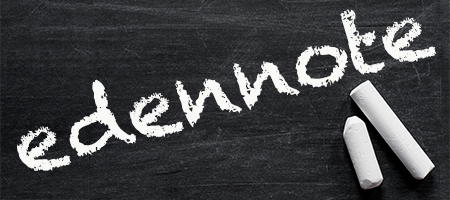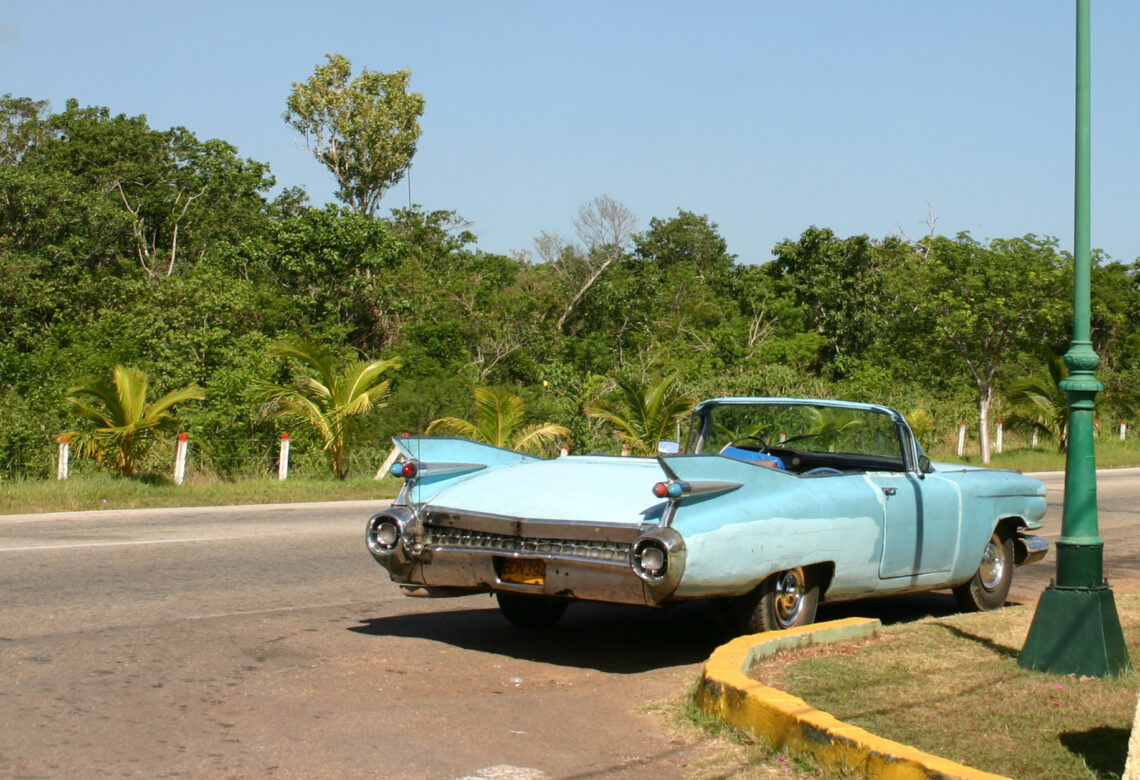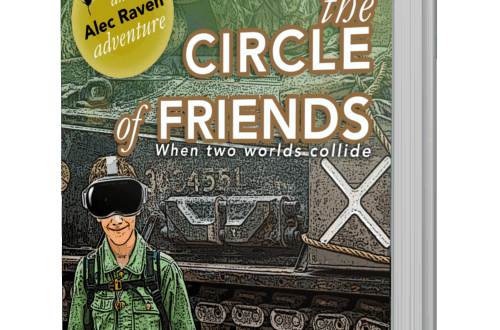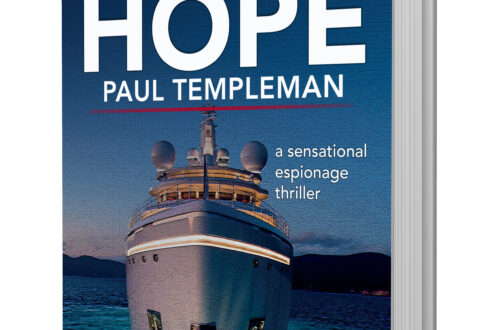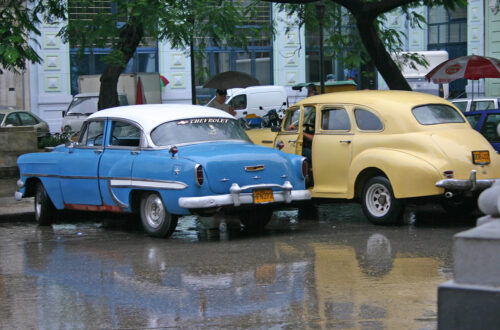‘People think tomorrow they can get rich. Those people are the procrastinators and the losers. NOW is the time to get rich.’
Dolores was transfixed. A religious fervour crackled in the air of the mouldy hall. She leaned forward in her seat, hands poised to clap. Elegant hands with a fresh manicure that she noticed even if others didn’t.
Beneath a golden banner bearing the words ‘Libre Coin,’ the stocky man with the shaven head strutted on stage. He wore a dark suit with sharp lines. His cufflinks sparkled in the spotlight, and his teeth matched his shirt.
All Creole speakers here: squatting on the lowermost step of Cuba’s equal society. ‘Do you want to be rich?’ he appealed in pleasing Creole, sweeping a hand around the audience like a shaman.
Nobody was in any doubt. The hall resounded with the reply: ‘Wi! Wi!’ ‘Yes!’
‘Do you want to be rich?’ he repeated, and the hall exploded. ‘Wi! Wi!’
The path to riches is an easy one, the man assured them, angling his microphone like a pop star. The living testament—he wore a rock of a Rolex that flashed when he twitched a starched cuff, and fine-soled Louis Vuitton loafers that slapped the wooden boards. His grin was all they needed to embark on the journey to riches with him—if only he would take them. A villa with a swimming pool and working air-conditioner. A Japanese car. Dolores wondered if the Rolex was fake. She made an effort to tramp her feet in rhythm with the others, in her slingback heels. She tried out the dream as she looked around, breathing the stale sweat and seeing the worn-out clothes of her fellow disciples. In modern Cuba it was possible to be rich like the Western tourists who gathered like paradise birds in the Hotel Nacional for cocktails. Her armpits were damp—the air-conditioning asthmatic, barely reaching the back of the hall where she sat. She wriggled in the hard wooden seat. Her bottom tingled.
‘I have a secret I’m going to share with all of you here today.’
‘Di nou!’ a woman cried, unable to contain her enthusiasm. ‘Tell us!’
Was she a plant? Dolores narrowed her eyes, seeking out the voice. Twisting off the cap of a bottle of Cristal water she sniffed at it before taking a draft. It smelt of the mouth of the sinkhole at home. She raised her eyes to the stage, leaving a crimson lipstick stain on the neck of her water bottle.
The man raised a finger for attention. ‘Just for today, and just for the people in this hall. I have negotiated a special price. Our complete education package. You buy this and you will get 50 Libre Coins in the package. Those coins can be worth thousands of dollars in only three months.’ Dolores jerked her head to see who gasped. ‘And what will I ask you for this package?’
Somebody shouted, ‘A thousand dollars.’ Mumbled awe from the audience.
The man on stage folded his arms, pursed his lips and shook his head. ‘Not a thousand dollars.’
Dolores heard whispered guesses. A woman in a florid scarf nudged her. ‘What do you think?’ she hissed.
‘Not seven hundred,’ said the man as the price tumbled. He held up a glossy-backed, thick-leaved folder embossed with a gold coin. Flapped it in the air. ‘Your passport to riches, right here in my hand.’ He looked around the audience. Mischievous. ‘What do you want to pay?’ A shout: ’Six hundred dollars!’
‘Warm,’ said the man, with a wide-mouthed grin.
The room was buzzing. Dolores didn’t know what it could be worth to make her an independent woman—her hombre was a Yankee who never saw her go without—but this was her chance to evade the threat of a squalid life in the barrios where her sister lived. She was swept on the tide—couldn’t help herself. ‘Five hundred bucks,’ she called out, feeling all eyes on her. Her stomach tightened. He pointed at her and laughed—a deep, sonorous laugh.
‘Not even five hundred. For today—and only today—I will gift you this package, our bronze package, for only four hundred and ninety-five dollars. A murmur. ‘And it’s only the start of your Libre life—and don’t forget, every Libre coin is saving Cuba from the effects of global warming.’
People were already reaching for their wallets and purses as the Libre Life refrain boomed from speakers in the ceiling.
‘Live your best life.
Live your Libre life.
‘It’s a gift,’ he shouted above the music.
A swell of applause arose as the Libre ambassador bounded from the stage, pumping hands and bumping fists.
Dolores thought she recognised the woman who had shouted ‘tell us!’ in the hall, making for the exit, as she took her place in the queue, gripping the golden chain of her fake Gucci handbag.
Two tables flanked the doors. People in threadbare, stale-smelling clothes shuffled forward to lay down bundles of dollars and New Republic Pesos, and walked outside with their bronze-level gifts. Dolores thought of the thousands of dollars that could be hers in just a few months, and hoped there would be a folder left—her passport to riches.
#
The day dazzled as Dolores stepped into the scrappy parking lot outside the hall, nursing her Libre Coin manual. The sun blinked off the shiny paintwork of two brand new Toyota Hiluxes parked nose to nose, one gold and one silver, presided over by two men in Libre Coin polo shirts bearing identical grins. ‘Spanish or Creole?’ he hustled, ‘Like to take a turn in the driving seat, señora?’ said one, like a come-on in a nightclub.
A few people were peering into the interior of the trucks, careful not to touch anything.
‘Why would I want to do that?’ said Dolores.
She caught him flash a secret look at the shadow of her breasts and she adjusted the buttons of her blouse. ‘Our two top performers will get one of these.’ A badge identified him as ‘Juan Bernito, VP Marketing’.
He pointed to his badge with pride. ‘Veep of Marketing. That’s me. Call me Juan.’
‘I already have a car.’ She sniffed, pushing back the bridge of her designer sunglasses. The cars had fat tyres, stood high off the ground and looked like they could handle themselves. A heat haze rose from the cracked concrete of the lot. A few scrawny palm trees rustled their leaves in restless angst.
‘Not like these, señora. Latest models. Emissions free.’
‘My car is already free,’ she said, looking past him at the leather upholstery.
Beyond the parking lot a motorcycle buzzed past carrying what looked like a whole family. An ancient Lada trailed a cloud of black exhaust.
‘What do I have to do to win one of these?’
Juan wielded a tablet computer. ‘Ki non ou?’ he said, slipping into Creole as his fingertip hovered over the tablet. What’s your name? He wore a brass ring on his pinky masquerading as gold.
What would she do with a car like that? How would she park it? What if she scratched that pretty paintwork? Dolores hesitated, then gave him her details with a deliberate return to Spanish. What harm could it do?
‘Dolores? Like Dollars? You’re already halfway to riches,’ he said with a breezy laugh. ‘Top the leaderboard for the month and you can win a car like this.’ He pressed a business card on her. ‘You do want a car like this, don’t you, Dolores?’ He touched the glossy paintwork like a caress, but withdrew his hand at once, bitten by the hot metal. ‘Our top performer last month was a waitress in Varadero.’
She took the card. There was a QR code and embossed type. The card was bright white in the sunshine. ‘I don’t need a car, and I’m not a waitress.’
A scrawny, skeletal dog sniffed at the tyre of one of the Hiluxes and when Juan kicked out with a shiny shoe it skittered away in a flurry of dust. It had left behind a curling brown deposit.
She wondered what Bob would make of this. An American sceptic who hadn’t been here to fall for Castro’s monologues in the Plaza de la Revolución like her parents had. She slipped the business card into her purse and walked away with a flutter of her hand at Juan, who she sensed would be watching the swing of her haunches that she knew could still tantalise.
When she had a mind to, she shared the American’s cavernous villa across town, and shared his bed. She had a vision of him now, cooking the plantains that revolted her…
#
Bob Northwick was in contemplative mood while he observed a man sweltering in the sun watching his house. Since leaving the Agency, he had wasted too many hours in thought, no longer having agency of his own. To their credit, the Cubans still let him live in Miramar where his once-grand villa stood, wedged between two clay-built tenements with flaking plaster that housed six families. Where else would he live? Cuba was his home now. He lived alone—whenever his chica Dolores stayed in the apartment on the Malecón that he paid for in dollars. Him and his dog, Raul.
It was time, he thought, from his eyrie above the street—the tall window with the panoramic view and the wooden blinds that were jammed halfway open or closed depending on his mood. He had lived with those broken blinds for a decade, as well as the burden of constant surveillance that went with the territory.
Across the street, in the shade of an enormous glossy-leaved Cuban laurel that curtseyed over the parapet of a broken fence, was his constant companion. A green polo and blue jeans gave him the unthreatening look of somebody’s gardener. Sometimes he might duck into his Honda and sit with the engine running, in the cool of the air conditioning. Sometimes he might flick through a paperback or scroll on his mobile. Less attentive than when Northwick had first spotted him, making no attempt to conceal his watching brief as Northwick’s importance had dwindled. No longer the CIA resident, after all. No longer much of anything. Still the DGI kept watch on its former enemy.
But now it was time for neighbours to acquaint themselves and put past bad blood to rest.
Northwick went downstairs, stepping around the languid form of a pony-sized Alsatian. It gave a nervous twitch. Making a grab for his pork-pie hat on its peg, he ducked beneath the giant leaves of a wayward palm tree and headed out of the door, slamming into a wall of heat and humidity that took his breath away. The man looked up from his phone without much interest.
As he crossed the empty street Northwick jammed his hat on his head. ‘I thought it was time,’ he called in Spanish.
The agent looked alarmed, flinging a furtive glance in every direction. At the old Pontiac jacked up at the kerbside; at the leaky pipe that dribbled in the gutter. A bird pecked at a crack in the concrete road. The sun beat down, malignant and relentless. Blank windows of crumbling villas bore sightless witness.
The agent had thick, black hair that flopped over his perspiring forehead. Northwick guessed he had a stash of water bottles in the car, which would be warm like bathwater—undrinkable.
Cicadas buzzed and clicked.
‘I’m Cuban now,’ said Northwick. ‘A citizen just like you—courtesy of your President. Services rendered is what they told me.’ He stopped short of the pavement. Gave the man space. ’Which begs the question: why are you still around? It’s too hot around here for another cold war.’
The man’s shoulders were slumped, like a fighter who’d fought a hopeless bout and lost. He prodded the dust with a toe of his sneaker.
‘I don’t know what you mean, señor.’ He pocketed his phone in a deft, defensive movement, as though to protect secret communications. Northwick scanned him for signs of a concealed weapon.
‘Do I know you?’ He avoided Northwick’s eyes. A bead of sweat made a transitory stain on the pavement.
‘If you don’t then the DGI has been wasting its money.’
‘I’m sorry, señor…’ He made a dismissive gesture that was very nearly believable.
‘I’m not Agency any more. But you know that.’ An admission to himself—note to self: no longer a player. Out to pasture. He scratched his stubble. ‘You’ve got an advantage over me. You know my name—what’s yours?’
The agent’s limbs suddenly seemed to loosen up, like a puppet whose strings have been released. He gave a mournful smile. ‘Andrés,’ he said. He thought for an instant then offered his hand. ‘Sorry about…’ A bird flapped into the air as a 1950’s Chevrolet with tinted windows hove into view, cruising past with its big V8 engine burbling. It left behind a sour taste of gasoline. Together they watched it turn at the junction without indicating, and heard it power away. A synchronised paranoia.
‘C’mon over and have a cold beer. If you’re going to be watching me we may as well be in the same room,’ said Northwick, giving the hand a perfunctory squeeze.
Andrés sighed. ‘Maybe,’ he said. But when Northwick headed back to the house he trailed a few steps behind, like a tail—and Northwick sensed him on the hook. A marlin on a long line.
